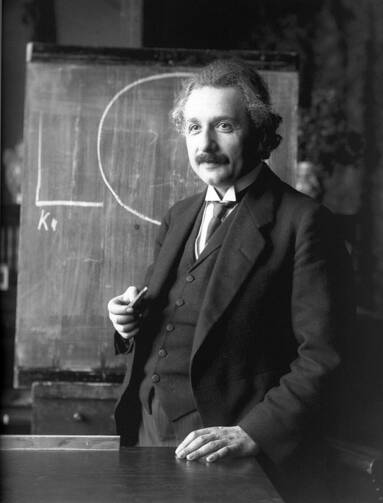One hundred years ago today, the Royal Prussian Academy of Sciences published a paper by Albert Einstein, based on a talk he had given there on Nov. 25. The topic was “general relativity.”
General relativity—it’s one of those science-speak-y terms that seem like they were created precisely not to be comprehended. Like the kind of thing you might make up to use as an excuse when your parents wondered why in fact you didn’t have a job yet, what were you wasting all your time doing? "Been working on general relativity."
And studying the theory itself doesn’t necessarily help. Consider this: We think of time as a constant. That is, adjusting for time zone, it is the same time right now on my watch as it is on yours, and on Mt. Kilimanjaro and deep in the Marianas Trench.
But in point of fact, we’re wrong. The farther you get away from the surface of the planet, the faster time passes. The watches of those reading this on International Space Station right now are actually microseconds ahead of those reading it on the planet.
This was Einstein’s discovery—that some rules of the cosmos that we think of as universally constant are actually universally (a.k.a. generally) relative. That in fact both time and space are warped by the mass of objects. When that mass is tiny, like you and me, the affect is literally next to nothing (although I like to think somewhere in here lies the explanation as to why conversations with some people seem to take FOREVER).
But when we are talking about planets and stars, the effect is pronounced. Time travels faster the farther you get from big objects. And objects also travel different paths. What we call “gravity” is in fact nothing more than the warping of space by objects of great mass. And if you had the equipment to measure precisely the path of falling objects, you would discover that everything falls not straight but along the curve of that warp.
(For a great short video about the theory of general relativity (from a Time Lord, no less), I highly recommend this.)
Of course, the real question is, so what? I mean, yes, this completely revolutionized the way physicists think about the universe, and was essential in the development of technology like GPS (which requires an understanding of that warping to function). That’s all very well and good. But what is in it for us?
For an answer, I reached out to Paul Mueller, S.J., a historian of science and religion who works at the Vatican Observatory (and is co-author of the recent book Would You Baptize an Extraterrestial?...and other Questions from the Astronomers' In-box at the Vatican Observatory). Mueller suggests in addition to simply appreciating Einstein’s genius, we should look to him as a beacon of the value of intellectual freedom. While everyone else was taking gravity for granted, Einstein was intellectually open enough to see questions that begged for investigation. “He was free enough to follow where his starting points led, even if that left behind the familiar.”
That freedom, notes Mueller, is so essential to the Christian life. “If we’re going to discern and live towards the Kingdom of God, we need to have hearts which are supple and free—hearts which can discern God’s starting point and follow where God leads, even if that means leaving behind the familiar, taken-for-granted framework of this world,” Mueller asserts.
“Einstein, discerning what really mattered, did not fear to seem intellectually foolish. Neither should we fear to seem to have hearts which are foolish, if we are discerning what really matters, with the Lord.”








